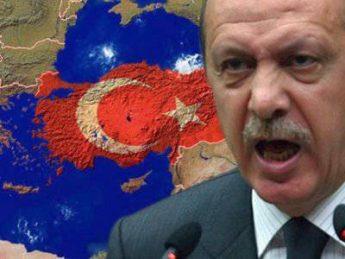
Syrian peace process under threat as Erdogan mulls military intervention
However, Turkish President Recep Tayyip Erdogan began calling for a 'unilateral' course of action — a sort of direct military incursion into Syria — even while the Vienna session was in progress as if he already knew its possible outcome.
While Turkey is contemplating a military intervention to protect its territorial integrity, such action would potentially send it on a collision course not only with Damascus, but also with Iran and Russia which have so far exercised restraint while dealing with Turkey's political follies. A direct military move by Ankara against Damascus may lead to a situation no amount of diplomacy may be able to control.
Turkey is prepared to take unilateral actions against the Islamic State (IS) in Syria to protect its southern border town of Kilis from IS attacks, Xinhua news agency reported quoting Erdogan on May 12.
'We are making necessary preparations in order to clear the other side of the border,' he said.
While Erdogan main line of defense or rather, attack is that he needs to absolutely protect Turkey's national sovereignty against dangerous radical militants, Ankara's military intervention will violate Syria’s own sovereignty and territorialintegrity. Moreover, it will be pitted against an army that has, in the recent months, successfully ridded a significant chunk of its territory of the control of IS.
Not only is Erdogan's stance a mockery of the Syrian army's success against IS and other foreign-funded groups but also a clear indication of how meaningless the whole dialogue process is when it comes to the Arab allies' war objectives.
Turkey's probable belligerence has come at a time when its direct involvement in Syria (read: leaked tapes of Turkish forces providing territorial sanctuary to IS fighters in Syria) has been exposed and when Washington itself is coming round to Russian stance regarding Syria and the way Russian military campaign has positively contributed to limiting the 'blood game' IS was playing there.
'Tens of thousands of lives have been saved and a million people have received aid, thanks to Syria ceasefire established with Russia's help,' US Secretary of State John Kerrysaidthis May in what can only described as a political volte-face.
Is this an indication of some sort of understanding reached between the U.S. and Russia? Speculation on this has caused distress among the Saudis and Turks, provoking them to threaten to resort to 'Plan B'. Their dissatisfaction over the 'lack' of US involvement has unwittingly added some credence to this speculation.
Quoting Erdogan further, Xinhua reported, “Turkey will not wait… while we have martyrs every day . I’d like to say that we will not hesitate to take unilateral steps on this issue.”
The issue of Kilis would be “litmus paper” for revealing the sincerity of coalition partners in the fight against the IS group, he said.
Erdogan complained that the US-led anti-IS coalition has not provided Turkey with the desired support — supportagainstwhat no one seems quite sure since Ankara's only woes have been against those factions which have actively sought to destroy terror: i.e. the Kurds.
The ‘Plan B’ that Saudi Arabia and Turkey have long been talking about has yet again become relevant due to the disagreement prevailing on transition in Syria. Were Turkey to invade Syria, it will only sabotage whatever progress has been achieved on peace front. It will also provide terror groups the much needed relief against the most resilient enemy they have so far faced.
Were such a scenario to take place, the main question that one should be raising is this: Will Russia be 'compelled' to redeploy its forces to protect the army it has been supporting militarily for almost a year now?
It cannot be gainsaid that the situation is extremely tricky in and around Syria. While the involvement of state and non-state actors is a good way to take all stakeholders on board, a resolution of the conflict that may satisfy all parties is a much more complex issue.
To an extent, it is the involvement of Kurds in the peace process that has come to really threaten Ankara's regional interests.
As it stands, and as both Turkish and Saudi officials' response clearly demonstrates, the probable resolution under consideration is far from what both countries have been aiming at.
This explains the escalation of conflicta situation that would certainly disrupt the 'peace' process and allow 'terror proliferation' in the region, further helping the Arab coalition, especially Turkey, to use the situation to weaken its enemy sitting both inside and outside of it.
Salman Rafi Sheikhis a freelance journalist and research analyst of international relations and Pakistan affairs. His area of interest is South and West Asian politics, the foreign policies of major powers, and Pakistani politics. He can be reached atsalmansheikh.ss11.sr@gmail.com
(Copyright 2016 Asia Times Holdings Limited, a duly registered Hong Kong company. All rights reserved. Please contact us about sales, syndication and republishing.)

Legal Disclaimer:
MENAFN provides the
information “as is” without warranty of any kind. We do not accept
any responsibility or liability for the accuracy, content, images,
videos, licenses, completeness, legality, or reliability of the information
contained in this article. If you have any complaints or copyright
issues related to this article, kindly contact the provider above.

















Comments
No comment